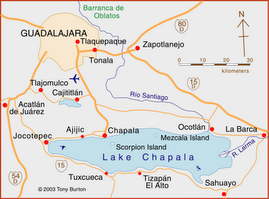

We recently participated in the first ever Democratic primary voting for Americans living abroad. As a voting group, we will have 22 delegates to the National Democratic Convention in Denver this August. The results were for Obama with 65% of the vote.
There was an article this weekend's Guadalajara Reporter about Obama and his plans for improving the US relation with Mexico, should he become the next US president. The Mexicans are clearly not happy with George W. Bush, and he has essentially ignored Mexico since it opted out of participation in his invasion and occupation of Iraq. Vicente Fox, seen as a lackey to Bush, has lost much popularity here. Calderon, the PAN candidate who replaced Fox as President, has distanced himself from the US administration. Barack Obama has suggested that he will focus considerably more on Mexican-American relations. He has proposed specific ideas which could help the situation: (1) Hold an annual meeting with Calderon. This may be largely symbolic but would undoubtedly bring the US president to Mexico and show that the US respects Mexico, which does not seem to be the case now. (2) Involve citizens, labor, the private sector, and NGO's from both countries to form an active bilateral agenda for discussions between both countries. (3) Invest in drug education on both sides of the border. Mexico, although the main conduit for drugs tot he US, is also facing many drug-use problems as well. (4) Disrupt money laundering and drug smuggling from the United States. I think this may be his toughest challenge, but his pledge to work with Calderon will help, since Calderon has made this a top priority here. (5) Develop a bilateral strategy for lifting up border communities, including creating micro-loans for Mexican businesses to create jobs. The most problems in Mexico tend to be in the border communities in terms of violence and economic desperation. (6) Finally, Obama hopes to renegotiate NAFTA to help create enforecable labor and environmental standards. NAFTA has not been good for Mexico, and has resulted in many corn, beans, and sugar farmers struggling to stay in business because the heavily subsidized US farmers can sell corn, beans, and sugar for less than Mexican farmers can.
Whether Obama can really deliver and help Mexican-American relations remains to be seen. But living in Mexico has opened my eyes to the other side of the problem of immigration to the United States.
First of all, I am surprised how many Mexican people I meet here have lived in the United States and have returned to Mexico. I am not sure why they have all returned, whether they were deported or chose to return on their own, but they seem to have great respect for the United States and miss being there. At the same time, they are emotionally attached to Mexico. Over Christmas, we met people who had returned to Mexico to spend time with their families. They were proud to demonstrate their fluency in English and were happy to be able to send money to their families here, but are very sad and frustrated with the hate being expressed for the Mexican immigrants, whether legal or illegal, in the United States.
I was also surprised at how many families have relatives living in the United States. Mexicans refer to the US as the "other side." In many small villages in Mexico, most of the young men have gone to the US, leaving their children and parents behind. It is almost a "rite of passage" in some Mexican towns for young men to cross the border for a year or two.
Although most Mexicans are not happy with the way they are being labeled in the US, they are most gracious hosts. They are unfailingly polite and helpful to Americans living here, and speak very positively of the United States. They are very frustrated that NAFTA, which I assumed would be good for Mexico, is hurting many aspects of their economy.
I think the debate about immigration in the United States is fueled by ignorance and racism. I am glad to see both McCain and Obama willing to adopt a more reasonable immigration policy towards Mexico. Both countries need each other, and the sooner US politicians come to grips with that reality, and start ignoring the hate mongers, the better off we'll all be.



































































No comments:
Post a Comment